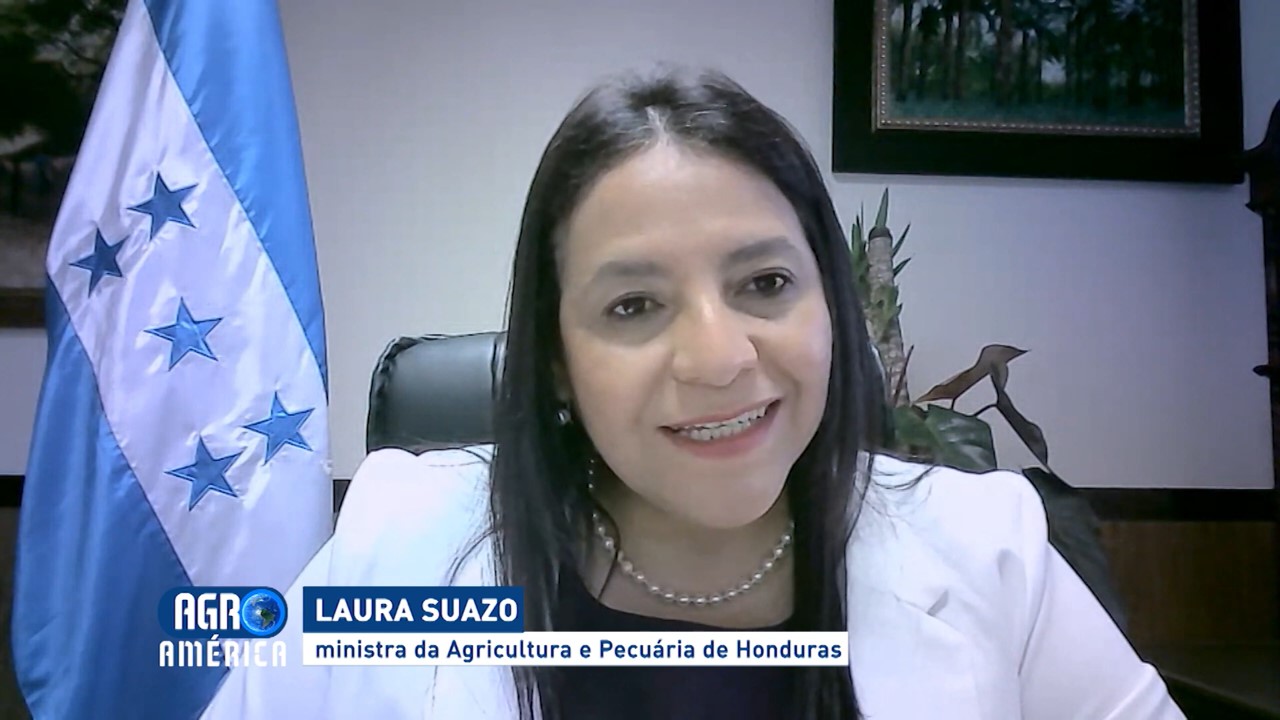Laura Suazo, the first women to be in charge of Honduras’ agriculture and livestock portfolio, expressed this view during an interview with the program, AgroAmerica, which airs on Brazil’s TV Agro Mais.

Brasilia, 7 September 2022 (IICA) – Increased development in the bioeconomy could provide Honduras and other Latin American countries with the key to reducing the dependence of their agriculture sectors on external inputs and curbing poverty in rural areas, said Laura Suazo, Secretary of Agriculture and Livestock of Honduras, during an interview with AgroAmerica, aired on the Brazilian channel, TV AgroMais.
“The bioeconomy is absolutely essential in the transition towards sustainable development and in combatting poverty, which is affecting most small farmers in Honduras. We cannot continue to produce as if we had an infinite supply of natural resources. We must utilize them in a manner that allows us to generate wealth without damaging the environment”, said Suazo, the first women to head the Agriculture and Livestock portfolio of Honduras. She in turn was appointed by the Central American country’s first female President, Xiomara Castro.
Suazo is an agricultural engineer who last June was named as Chair of the Executive Committee of the Inter-American Institute for Cooperation on Agriculture (IICA), the governing body of the specialized international agency for agricultural and rural development.
“I felt very honored to be nominated to chair the Executive Committee. Through IICA, the countries of the Americas are tackling global challenges in agriculture. Some years ago, the challenges were mainly structural poverty in rural areas and the impact of climate change. Today, we are also faced with an economy weakened by the COVID-19 pandemic and serious problems triggered by the increase in chemical fertilizer prices, fuel and shipping costs, due to the war in Eastern Europe”, explained Suazo.
“Farmers must now contend with higher costs that cannot be recovered from the prices they are paid for the food they produce”, she said.
“We should seek to resolve this crisis situation by increasing the development of the bioeconomy and technology use”, remarked Suazo. She stated that, “These are key aspects of the work that we are carrying out with IICA, an organization that serves a vital role, as it builds partnerships and bridges between stakeholders, such as universities, governments and companies. Together we can find better and more rapid solutions to place technology and information in the hands of small farmers. We need to ensure that knowledge is shared with them, thus enabling science to solve the real problems of agriculture, which are the dependence on external inputs and poverty”.
The bioeconomy is a system that seeks to fully exploit biological resources and principles in production and industrial processes, and which has been driven by the new frontiers of science, technology, knowledge and innovation. In recent years, it has expanded significantly in Latin America and the Caribbean, although its potential for greater development is enormous, due to the region’s wealth of natural resources.
As such, Suazo underscored the fact that the production and use of organic fertilizers represent an opportunity for Honduras. “Not only do they stand to be more efficient than chemical fertilizers, but they can generate jobs in the country and reduce import dependence. Today, there is a growing demand for and supply of organic fertilizer in Honduras, although some farmers are still not fully aware of its potential. This could be an opportunity to develop a big business in the country”.
The Secretary also spoke of the impact of climate change on agriculture in Honduras, which she described as one of the countries in the world that is most vulnerable to this global phenomenon.
“Part of this vulnerability”, she said “is the result of a poor economy. Given the lack of infrastructure, many people live in areas where it is impossible to survive and there is no adequate training to show producers how to adapt. We must do more and opportunities exist. Although we have enough rainfall, we do not have the capacity to store water to enable our producers to use this to produce during the dry season, although there are some pilot large-scale reservoir projects for cooperatives. We must also revive ancestral practices that improve sustainability. These are issues that the country needs to address”.
Suazo was adamant that the priority of her administration is to help farmers to boost agricultural output, rehabilitate poor soils and facilitate fair trade, to allow farmers to enjoy a decent life and encourage them to remain in the countryside.
Finally, she said that, “We are striving to change agriculture. Change begins when the person analyzes the causes of poverty and is given assistance in identifying opportunities. We are helping communities to organize themselves; to establish priorities; and to identify the resources that exist in each region to promote the local economy. We need a humane agriculture sector that allows farmers to regain their dignity and pride in being small farmers”.
Agro America is a program on Brazil’s TV AgroMais channel – a member of the Grupo Bandeirantes communication group that is the product of a partnership with the Inter-American Institute for Cooperation on Agriculture (IICA). The program depicts the current reality of the agriculture sector and rural areas in IICA member countries, with a view to promoting experience sharing and discussions on the challenges and opportunities for agricultural and rural development in Latin America and the Caribbean.
More information:
Institutional Communication Division.
comunicacion.institucional@iica.int











